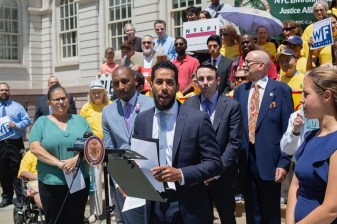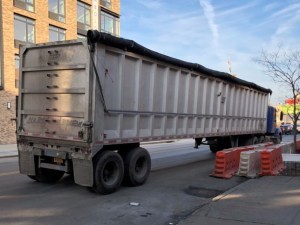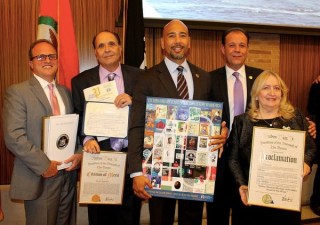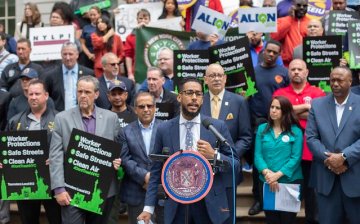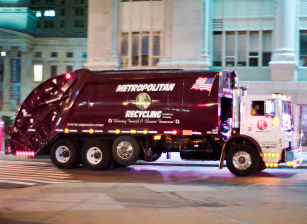There’s a Big Fight Brewing in the City Council Over Trash Carting Reforms
The council votes tomorrow on a bill to distribute garbage truck traffic more fairly. A more contentious battle over the private trash carting industry looms ahead.
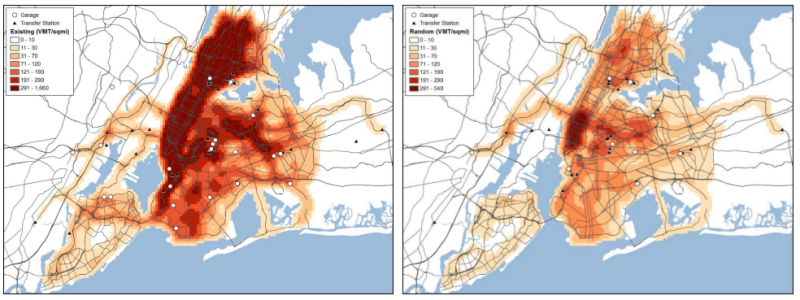
Tomorrow, the City Council will vote on a bill to distribute garbage truck traffic more fairly across different neighborhoods. That legislation, which has languished for nearly a decade, is expected to pass. A more contentious battle over the private trash carting industry will follow later this summer, when the city releases its plan to institute “zone-based” commercial waste collection.
The bill on the agenda tomorrow, Intro 157, is the newest version of legislation to cap the amount of waste delivered to transfer stations in the South Bronx, north Brooklyn, and southeast Queens. About 75 percent of the city’s trash is processed in those three neighborhoods, burdening low-income communities of color with a disproportionate share of garbage truck traffic. The bill stipulates that no single community board district can process more than 10 percent of the city’s trash.
Enacting Intro 157 will ensure that every neighborhood has “skin in the game” when it comes to the city’s waste production, said NYC Environmental Justice Alliance Executive Director Eddie Bautista.
A previous version of the bill died in committee last December after Council Member I. Daneek Miller, who represents southeast Queens, withdrew his support. Carting businesses in his district opposed the measure. Now, with the support of Council Speaker Corey Johnson, advocates believe they have the 26 votes to pass it.
Intro 157 builds on the Bloomberg administration’s 2006 Solid Waste Management Plan, which called for new waterfront transfer stations to shift long-haul trash cargo from trucks on city streets to boats and trains. At the time, the City Council was expected to pass legislation reducing the amount of trash coming to transfer stations in the three target areas, but so far it hasn’t.
“The rebuilding of the city’s marine transfer systems was just a piece. The other piece was waste equity,” Bautista said. “The marine transfer stations were never going to be able to deal with the severity of commercial waste capacity of these three communities.”
Under speakers Christine Quinn and Melissa Mark-Viverito, the City Council failed to pass the legislation. “We tried to get this done under three different speakers, and this is the first speaker to actually step up to say, ‘I politically want to see this happen,'” Bautista said. “That’s a huge change.”
While the bill has been modified many times since it was originally floated in 2010, Bautista said the only change since December was the elimination of a carve-out to exempt Sanitation Salvage, whose owners, the Squitieri family, are power players in the Bronx Democratic Party.
An investigation by Kiera Feldman at ProPublica exposed Sanitation Salvage and the Squitieris for shortchanging worker protections, implicating the company in the death of Mouctar Diallo, 21. A Sanitation Salvage driver ran over and killed Diallo in April, with police originally identifying him as a “homeless person” to the press. In fact, Diallo was working as a “third man” on a Sanitation Salvage route alongside Sean Spence, the driver who struck him.
The Squitieris and Sanitation Salvage also figure prominently in the lobbying campaign to stop the city from overhauling the private carting industry.
In 2016, the Department of Sanitation recommended shifting the private carting industry to a “zone-based” collection system, where companies would compete for franchises to collect commercial trash within designated areas. Under the current system, private carters make deals with one business at a time, leading to long, inefficient routes.
This set-up exhausts workers and encourages private carting crews to cut corners. The result is a disaster for public safety. Since 2010, drivers for private carters have killed 33 people in New York. City sanitation workers, on the other hand, have not been involved in a fatal crash since 2014.
The city has spent two years preparing for zone-based commercial waste collection, and is expected to release its draft plan in a month. The closer the moment of reckoning gets, the more intense the opposition from private carting businesses like Sanitation Salvage, as well as the real estate lobby.
Advocates wanted each of the 20 zones in the new system to be contracted out to a single company. However, Sanitation Commissioner Kathryn Garcia told Politico last week that three to five carters will be assigned to each zone.
More carters operating in each zone means more truck traffic and pollution. “They’re trying to weaken the plan, that’s for sure,” said Maritza Silva-Farrell, executive director of ALIGN, a coalition of labor and neighborhood organizations. “If we want to have a complete transformation of the industry, we have to have a deep reform of the system.”
